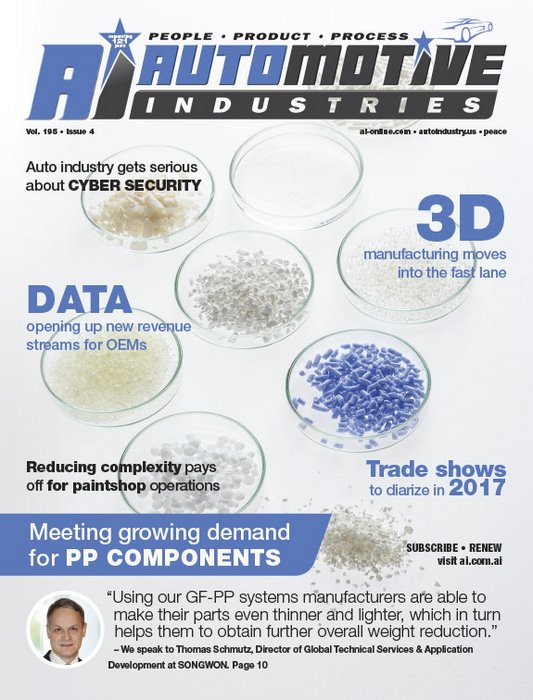
Steadily increasing demand for polypropylene (PP) components in vehicles and other applications is reflected in the first half results announced by the SONGWON Industrial Group.
Growth in consolidated sales reported by the group for the first half of 2016 resulted in a 76.8% increase in gross profitability compared to the first six months of 2015.
With headquarters in Ulsan, Korea, the SONGWON Industrial Group comprises 19 companies including two joint ventures and two representative offices located in 10 countries on three continents. The company has 10 manufacturing facilities, three of which are located in Korea, and the others in Germany, China, USA, India, UAE, as well as two manufacturing JV plants in China, one of which is currently under construction. SONGWON also has a worldwide network sales and customer service offices, logistics hubs and stocking distributors.
Automotive Industries (AI) asked Thomas Schmutz, Director of Global Technical Services & Application Development at SONGWON, how the company is meeting the stringent demands of the automotive industry for weight and cost reduction.
Schmutz: For some time now vehicle manufacturers have been achieving their weight reduction and cost saving targets through the extensive use of polypropylene (PP)-based materials to replace engineering plastics and metals in automotive parts. In response to this trend we developed our SONGXTEND® 2124 long-term thermal stabilizer (LTTS). It is an ideal solution for more demanding applications such as glass fiber reinforced PP (GF-PP). Using our GF-PP systems manufacturers are able to make their parts even thinner and lighter, which in turn helps them to obtain further overall weight reduction.
AI: What range of stabilizers does SONGWON offer at present?
Schmutz: We currently offer a range of four SONGXTEND® LTTS stabilizers for GF-PP that have the performance and cost competitiveness necessary to meet the demands of the market.
AI: How does the new SONGXTEND® 2124 stabilizer work?
Schmutz: After screening different additive systems we discovered a special synergistic effect by combining a special antioxidant with a secondary stabilizer. It is this combination that leads to an improved LTTS for GF-PP.
AI: How does SONGXTEND® 2124 help in terms of cost?
Schmutz: In terms of cost savings, being able to produce a thinner or lighter part contributes to a lighter overall car weight, and therefore lower CO2 emissions are generated. Furthermore, SONGXTEND® 2124 achieves better LTTS and makes it possible for compounders to replace engineering plastics which are more expensive than GF-PP.
AI: Where do you see the main growth opportunities for SONGWON?
Schmutz: All the major car manufacturers throughout the world today are faced with meeting stricter fuel economy standards. Using better performing and lighter manufacturing materials is one of the ways they are doing this. China is the world’s largest auto market and annual vehicle sales are expected to reach more than 30 million by 2020. We’re confident that Chinese compounders will adopt our new LTTS system. The first commercial successes we’ve already seen there confirm our strategic intent to focus on this huge market.
AI: And what are the main constraints and challenges?
Schmutz: I would say that, for us, time is probably the main constraint. New systems like our SONGXTEND® range of LTTS stabilizers are usually only adopted in the development of new platforms. The reason behind this is that it is quite difficult to replace already existing formulations. For this reason we anticipate the adoption of our SONGXTEND® 2124 stabilizer by the industry will take some time.
AI: What is SONGWON’s global manufacturing footprint?
Schmutz: SONGWON has been in the business for over 50 years. As the second-largest producer of antioxidants we have a very good and well-established global infrastructure in sales and marketing. So, promoting the SONGXTEND® 2124 stabilizer in all key automotive markets is easy for us.
AI: What can we expect from SONGWON in the future?
Schmutz: We aim to consistently stay at the forefront of market requirements by maintaining close contact with our customers and listening to their current challenges and potential needs. At SONGWON product development is a never-ending process and our actions are always governed by what our customers require. At the moment, continuing our efforts in joint development with SABO, we are working towards launching a new light stabilizer for the automotive industry which is even more effective in terms of cost and performance.
Editor’s note: SONGWON teamed with Italian HALS (Hindered Amine Light Stabilizer) producer in 2013 to extend the two companies’ global reach.









More Stories
Acoustic sensor systems and Fraunhofer measurement technology for in practical testing ͏
OSI Systems Receives $10 Million Order for Cargo and Vehicle Inspection Systems
Mitsubishi Electric Automotive America Launches Guardian Generation 3 Trial with Seeing Machines in North America